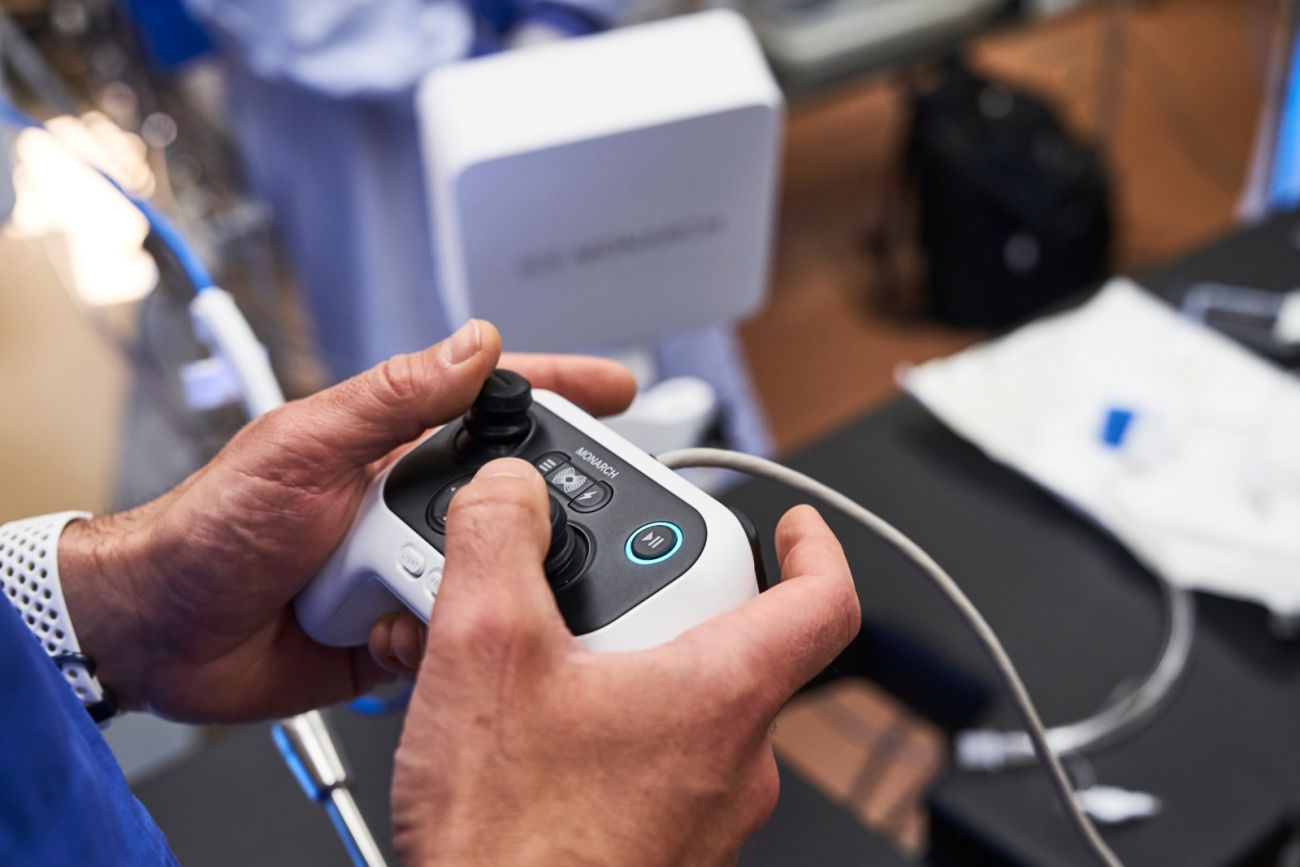Minimally invasive tool uses robotic technology to enable earlier, more accurate diagnosis of lung nodules
- Allows access to lesions deep in lung unreachable by traditional imaging tools
- New approach enables real-time, continuous visualization of the airways
- Physicians will be able to diagnose, biopsy lesions in minimally invasive way
BUFFALO, N.Y. — Lung specialists at Roswell Park Comprehensive Cancer Center now have a tool for visualizing and reaching lung nodules through a minimally invasive approach, enabling earlier diagnosis of cancer, smaller biopsies and broader treatment options for patients. The Buffalo-based cancer center has become the first facility in New York State to implement Auris Health Inc.’s Monarch™ platform for robotic navigational bronchoscopy into its interventional pulmonology program.
Robotic navigational bronchoscopy can benefit patients who have a potentially concerning lung nodule, typically detected by a CT scan. It allows physicians to safely biopsy very small, difficult-to-reach areas of the lung, enabling earlier diagnosis of suspicious lesions that were previously inaccessible without surgery.
“Peripheral nodules located in the outer section of the lungs are common — they’re found in up to a third of adults who get a chest X-ray or CT scan,” notes Sai Yendamuri, MD, FACS, Chair of Thoracic Surgery and Professor of Oncology at Roswell Park. “The vast majority of these concerning lesions — 96% — are not cancerous and don’t require treatment, but which ones? Earlier technologies did not allow us to effectively reach the lung periphery and determine the nature of the nodule as this new tool can.”
The Monarch system integrates robotics and software with bronchoscopy, allowing for real-time, continuous visualization of the bronchial tubes, or airways, through a flexible endoscope that physicians can navigate to the outer regions of the lung. Using a handheld console, physicians can access traditional endoscopic views of the lung along with computer-assisted navigation based on 3-D models of the patient’s own anatomy.
There are many causes that may make lung cells appear as a mass or area of concern on traditional imaging — including not only cancer but also scar tissue, infection or inflammation, explains interventional pulmonologist Nathaniel Ivanick, MD, Assistant Professor of Oncology in Roswell Park’s Department of Thoracic Surgery.
“I have a number of tools at my disposal, and robotic navigational bronchoscopy brings all of those tools together and allows me to take information from all of those tools to choose where I’m going to take the biopsy with the greatest accuracy, the greatest safety and with real-time visualization,” he says. “By diagnosing any cancerous tumors earlier on when they are smaller, we have more treatment options to offer our patients, many of whom will be candidates for less-invasive surgeries, or may even be able to avoid surgery entirely.”
Among people screened for lung cancer because they are at high risk for the disease, clinicians find lung nodules deemed to be suspicious in about 24% of cases. Of those, slightly less than 4% are found to be cancerous.
Roswell Park is able to offer this new approach to patients because of donations from individuals and organizations. A $600,000 allocation from the Roswell Park Alliance Foundation covers the cost of the new system as well as some of the associated costs of implementation.
“Roswell Park is once again leading the way in an important area of care,” says Shirley Johnson, MBA, MS, RN, NEA-BC, Chief Clinical Operations Officer at the cancer center. “We are so very grateful to the many generous and passionate donors who support our mission to offer the best and most effective options for diagnosis, treatment and prevention of cancer.”
“It’s amazing to see how technology has changed the way we detect lung tumors,” adds Dr. Yendamuri. “Ten or 15 years ago, it was not uncommon for patients to have large, untreatable tumors by the time they were diagnosed with lung cancer. But new treatment options and precision detection have changed the landscape entirely.”
More information about this new diagnostic option is available here.
Editor's note: Additional b-roll is available for media upon request.
###
Roswell Park Comprehensive Cancer Center is a community united by the drive to eliminate cancer’s grip on humanity by unlocking its secrets through personalized approaches and unleashing the healing power of hope. Founded by Dr. Roswell Park in 1898, it is the only National Cancer Institute-designated comprehensive cancer center in Upstate New York. Learn more at www.roswellpark.org, or contact us at 1-800-ROSWELL (1-800-767-9355) or ASKRoswell@RoswellPark.org.
Annie Deck-Miller, Senior Media Relations Manager
716-845-8593; annie.deck-miller@roswellpark.org
